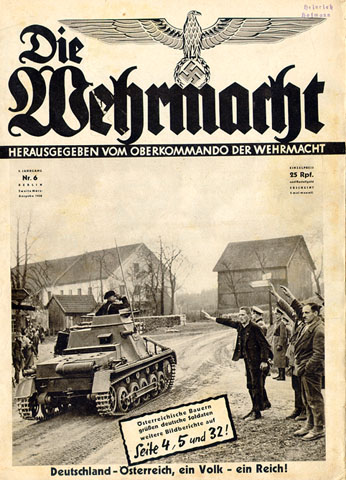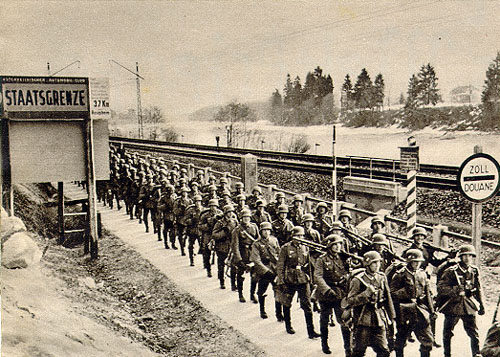


Background: The German army began publishing a biweekly magazine in 1937. This article is the first reporting on the German march into Austria on 12 March 1938. I include one of the eight photographs. Many Austrians did indeed welcome unification with Germany. A provision of the Treaty of Versailles had banned any such unification.
The source: “Mit den deutschen Soldaten im befreiten österreich,” Die Wehrmacht, 2 (1938, Nr. 6), pp. 4-5.
 Ancient German longings have been fulfilled. The dream of a great German
people’s Reich stretching from the Eider to the Brenner and from the
Rhine to the Leitha has been realized. German soldiers always supported
the drive for unity, and were always ready to bleed and die for it.
And they have bled and died for it when it was necessary. Many were
they stations along the German tribes’ long fateful journey from separateness
to unity. Each of these stations is marked by the graves of German soldiers,
who gave their lives to achieve no more than a step in the long process.
Now we have reached the goal. The will and creativity of the great Führer
of the German people have given final form to the united German state.
It fills German soldiers with pride that they, too, had their part
in this great accomplishment. Adolf Hitler’s German soldiers did not
march into German Austria in battle. They entered German land as representatives
of a general German will to unity to establish brotherhood with the
German people and soldiers there. It was a great demonstration of the
community of German blood.
Ancient German longings have been fulfilled. The dream of a great German
people’s Reich stretching from the Eider to the Brenner and from the
Rhine to the Leitha has been realized. German soldiers always supported
the drive for unity, and were always ready to bleed and die for it.
And they have bled and died for it when it was necessary. Many were
they stations along the German tribes’ long fateful journey from separateness
to unity. Each of these stations is marked by the graves of German soldiers,
who gave their lives to achieve no more than a step in the long process.
Now we have reached the goal. The will and creativity of the great Führer
of the German people have given final form to the united German state.
It fills German soldiers with pride that they, too, had their part
in this great accomplishment. Adolf Hitler’s German soldiers did not
march into German Austria in battle. They entered German land as representatives
of a general German will to unity to establish brotherhood with the
German people and soldiers there. It was a great demonstration of the
community of German blood.
In this spirit the German army crossed the Austrian border at many places on the immortal morning of 12 March 1938. They were received in the same spirit by the German-Austrian population. Everywhere and without exception, there was invisible, spontaneous contact from heart to heart, that mysterious flow of natural connectedness: in the mountains of Tyrolia, in the Salzburg hills, in Upper Austria, on the Danube and the Inn, and then into the farthest corners of Steiermark, Kärnten, the Vienna Woods and the Burgenland. It was more than mere liking — it was love at first sight. Who among our soldiers in gray or blue will ever forget the joy looking his way from the eyes of all the Austrians who lined the streets of the cities and villages! Who will not still hear the enthusiastic shouts that everywhere received him to the end of his days? Who does not remember the countless pastries given them by the joyous generosity of these German people! In some places, a flood of cigarette packages fell on the German vehicles.
True, they were hard, strenuous days. The soldiers marched 60 kilometers
or more each day. The motorized units moved forward day and night. Our
riflemen and riders, engineers and drivers, probably slept even less
during the march into Austria than they did during their last maneuvers —
that is, not at all. But extraordinary military accomplishments have
their rewards. Each soldier felt the proud glow of manliness, a feeling
twice as strong given the admiration of their deeds one could see every
hour, indeed every minute, in the eyes of the population. And there
was also admiration from the experts. Comrades from the former Austrian
army also admired our men’s achievements. Without exception they were
eager to join the German army. However diligent and spirited the army
of a small country may be, healthy military initiative can find no satisfaction.
Only the army of a great power gives the true soldier opportunity and
space for developing all of his capabilities.
Not only the officers and soldiers of the former Austrian army have just expectations, but also each Austrian citizen. They all saw the German military’s divisions and air squadrons not only as the representatives of the German will for unity, but also as the representatives of the new German great power. The German in Austria can raise his head more freely, proudly, and self-confidently than ever before. He is German. Not only in a national political sense, but also in a governmental and military sense. He has become a citizen and soldier of the German army.
Page copyright © 1998 by Randall Bytwerk. No unauthorized reproduction. My e-mail address is available on the FAQ page.
Go to the 1933-1945 Page.
Go to the German Propaganda Archive Home Page.